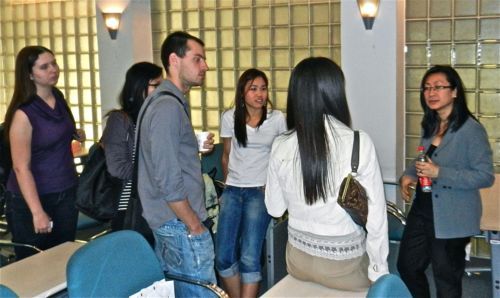 |
Tini Tran, right, chats with students after her talk
on "Survival Skills for a Foreign Correspondent"
|
As a refugee from Vietnam living in the U.S., she had been very shy. But as a reporter on her school newspaper, she could ask anyone any question at any time. She felt transformed, like one of those superheroes who acquires special powers by donning a magic cape. She was shy no more.
Tran, a veteran correspondent for the Associated Press in Beijing, Vietnam, Afghanistan and Iraq, was a guest of the Global Business Journalism program at Tsinghua University April 13.
She is taking a one-year break from her work to study Chinese full-time at Tsinghua. She felt that not being fluent in the language left her unable to humanize events such as the massive Sichuan earthquake she covered in 2008. Surrounded by victims desperate to tell their stories, she could not break the language barrier.
Gutsy
It was her fluency in Vietnamese and a gutsy move that helped her get her first foreign assignment. She was a rookie reporter working at the Nashville Tennessean in 1995, the 20th anniversary of the U.S. pullout from Vietnam. She went to her editors and pitched them on an idea: she would go back to the country she left at age 4 and tell the stories of what happened to family and friends during and after the war. As the editors listened, "I was so nervous, I was shaking," she told the students. The editors said yes on the spot.
Four years later, she went back to Vietnam as an AP correspondent and roamed the region for stories. In the wake of 9/11, the AP asked for volunteers to cover the military buildup in Afghanistan, and she raised her hand. "I was certainly curious -- curious or foolhardy. I wanted to go and experience different things. My parents weren't happy."
Under fire
Later she was assigned for weeks at a time to cover the war in Iraq, where she was embedded with U.S. soldiers and came under fire many times.
Students peppered her with questions during the informal session. If she saw someone wounded, a student asked, would she first take a picture or help the person? She would help. First aid was part of the several weeks of safety training she received before going to conflict zones. "I know what to do when I see someone with a hole in their chest."
Was she often frightened? "I felt most in danger when I was with the soldiers because they were a target," she said. When out on her own, she always was assigned a security guard and a chase car. "The AP was particularly security conscious."
What's next? She wants to keep working in China. There are many more stories to tell.
Related:
No comments:
Post a Comment